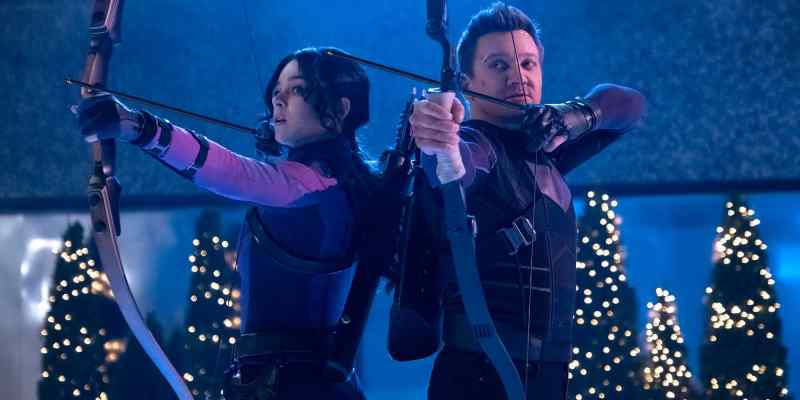On paper, Hawkeye has an interesting premise.
During an event known as “the Blip,” Clint Barton (Jeremy Renner) lost his entire family. He reacted to this trauma by having a breakdown. He used the opportunity to reinvent himself as the murderous vigilante known as “Ronin.” Ronin traveled around the globe, from Juárez to Tokyo, murdering entire families of organized criminals. He did this with no oversight, no sanction, no process. Reconciled to the loss of his family, Clint positioned himself as judge, jury, and executioner.
Then, against all odds, the Avengers reversed “the Blip.” Clint was reunited with his family. The events of Hawkeye make it clear that the general public has no idea that the Avenger known as Hawkeye was also the mass murderer known as Ronin. At least some of Clint’s teammates know. His best friend Natasha Romanoff (Scarlett Johansson) covered for him. James Rhodes (Don Cheadle) tracked him. When Clint rejoined the team in Avengers: Endgame, he wore a variant of his Ronin costume.
Hawkeye joins Clint two years after the events of Endgame. After a brief prologue introducing a young Kate Bishop (Clara Stack) during the events of The Avengers, the audience joins Clint during a performance of the Broadway musical Rogers. Obviously riffing on the success of Hamilton, the musical is a mythic reimagining of the Battle of New York from The Avengers. There are no jokes about how useless Hawkeye is. He is placed front and center with the rest of the team.
Hawkeye repeatedly returns to the idea of Hawkeye’s celebrity. In the opening episode, a theater patron bothers Clint for a selfie. Later on, a grown-up Kate (Hailee Steinfeld) offers Clint advice on managing his “brand.” In the second episode, Clint uses his celebrity to gain access to a live-action role-playing game run by New York’s first responders, where the players recognize a true superhero walking among them. Hawkeye is a hero. Clint is a celebrity. Of course, he is also a mass murderer.

Clint becomes embroiled in the plot of Hawkeye when the Ronin suit resurfaces at an underground auction. Kate steals the costume and is filmed running through the streets of New York wearing it. The press is suddenly talking about Ronin again. This is bad news for Clint, who had planned to spend the holidays with his family, but instead he has to recover what his wife Laura (Linda Cardellini) describes as the “problematic wardrobe” that ties him to a spate of unsolved mass murders.
This is the premise of a film noir. The lead character has done something monstrous and is desperately trying to recover the only evidence that ties them to the crime. It’s the driving force in classic movies like Lift the Scaffold. This year alone, both The Guilty and The Little Things are about law enforcement officials trying to cover up their complicity in horrible events. Superheroes are not law enforcement, but Hawkeye emphasizes Clint’s celebrity enough to suggest an equivalence.
It’s a hell of a hook for a show like this. After all, so much of the current phase of the Marvel Cinematic Universe has been about grappling with the fallout from Endgame. WandaVision is about Wanda Maximoff (Elizabeth Olsen) coming to terms with the loss of Vision (Paul Bettany). The Falcon and the Winter Soldier is about the battle over who gets to be the next Captain America. Spider-Man: Far From Home found Peter Parker (Tom Holland) mourning Tony Stark (Robert Downey Jr.).
Clint’s reinvention of himself as a murderous vigilante remains one of the stranger (and more controversial) creative choices in Endgame, particularly when the movie made the decision that Natasha would sacrifice herself for him. There are moments in the first episode of Hawkeye where it seems like Clint is uncomfortable with the hagiography of Hawkeye, leaving Rogers during the first act and generally being uncomfortable with fans. Maybe Clint realizes that he isn’t really a hero.

After all, “character desperately tries to recover evidence of their involvement with a crime” isn’t a heroic plot beat. It’s typically the plot driving the antagonists in these sorts of stories. The climax of The Departed finds corrupt cop John Sullivan (Matt Damon) scrambling to recover evidence that he worked for local mobster Frank Costello (Jack Nicholson). Cop Car focuses on corrupt Sheriff Kretzer (Kevin Bacon) trying to recover the eponymous vehicle before anyone opens the trunk.
However, Hawkeye quickly pulls back from anything that might make the character or the audience uncomfortable. This isn’t a surprise, given that WandaVision was a show that was eager to forgive a former terrorist, responsible for several major international incidents with civilian casualties, for holding an entire town hostage to work through her grief. It’s no surprise that Hawkeye refuses to dwell on what Clint is actually doing and what the implications of that actually are.
Given the way that Clint focuses on the actor playing Natasha (Meghan Manning) in Rogers, Hawkeye suggests that Clint’s discomfort with the hero worship around him is primarily rooted in the fact that he misses his old friend. Similarly, Clint’s interaction with a firefighter fan (Clayton English) at the live-action role-playing game suggests that Clint needs to let himself relax and enjoy celebrity. The problem isn’t that people worship Clint; the problem is that Clint is too uptight to accept that.

The counterargument would be that Hawkeye is positioning itself as a feel-good buddy Christmas adventure. The series takes place around and is being released to coincide with Christmas. The trailer is set to “It’s the Most Wonderful Time of the Year.” The show’s central tension is whether Clint will get back to his family for the holiday, having already missed gingerbread house-making. Head writer Jonathan Igla has compared the show to Christmas action classics like Die Hard or Lethal Weapon.
However, this glosses over the fact that both Die Hard and Lethal Weapon were capable of both great character work and real darkness. Lethal Weapon is the story of Martin Riggs (Mel Gibson), a widowed veteran of the Vietnam War who is still defined and shaped by that trauma in a way that makes him dangerous and unreliable. Lethal Weapon explicitly ties its holiday adventure to Riggs’ service in Vietnam, with the movie’s drug operation explicitly tied back to the conflict.
Similarly, Die Hard focuses on a divorced police officer named John McClane (Bruce Willis), who effectively sabotaged his own marriage and has to win back his estranged wife Holly Gennero (Bonnie Bedelia) while also fighting a deadly terrorist takeover of Nakatomi Plaza. Both Lethal Weapon and Die Hard are tremendously fun movies, but they take their characters and stakes seriously in a way that Hawkeye refuses to. There are minimal stakes in Hawkeye.

This is obvious even looking at the emotional stakes, with Clint’s efforts to have a family Christmas. The decision to set the movie two years after Endgame already dilutes the tension, as it undercuts the question of what the first Christmas with the reunited Barton family was like. More than that, while Clint’s efforts to spend time with his kids and come home for Christmas are nice, there’s no real sense of what is actually at stake here.
Die Hard foregrounds the stakes for its protagonist by having John and Holly separated at the start of the film and positioning the movie as an opportunity for reconciliation. Maybe it might have been more interesting to do something with Clint and Laura. After all, it’s not even clear if Laura knows exactly what Clint got up to during her absence. It would be a compelling dramatic hook for Clint to have his family returned and to discover that his own actions had pushed them away from him.
It’s easy to imagine a version of Hawkeye with real emotional stakes, where Clint and Laura have separated and Laura is considering taking Clint back if he can prove he was past the trauma of Endgame. This would give weight to Clint’s time with his children, add tension to his attempts to recover the Ronin costume, and give Linda Cardellini more to play than just “loving, waiting spouse.” It would also make Hawkeye a story of familial reconciliation – a true Christmas story.
Hawkeye has a lot of potential to do something genuinely interesting within the framework of the Marvel Cinematic Universe, with a character who has been defined by interesting (if inconsistent) creative choices. Sadly, Hawkeye misses the target.
